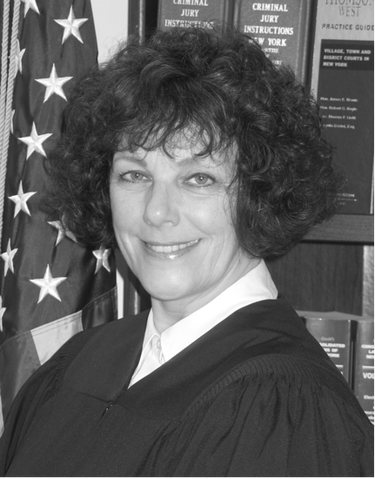Jean Gagnon, Knox judge candidate
KNOX — Seeking a third four-year term, Judge Jean Gagnon, a Democrat, wanted to be more involved in the community when she first sought her post, one of two town justices. She is running unopposed on Conservative, Democratic, and Independence Party lines.
Gagnon, a member of the Knox Youth Council, said presiding in town court is rewarding because she gets to work with young people and see them improve. There are times, though, when she is called in for arraignments at odd hours.
“When I first came on, the town of Knox did not have the best reputation for coming out in the middle of the night, which means an adjacent town has to cover you,” said Gagnon.
Gagnon, 57, manages a travel and tourism agency, Plaza Travel, in Latham and used to teach students about the travel industry at Syracuse University and Schenectady County Community College. She grew up on Long Island, moved to Syracuse when she was 16, and then to Knox 16 years ago.
In the next four years, Gagnon said, she will continue to learn about changing laws, as required, and hopes a request for grant money from the state’s Office of Court Administration will help with paying for a copier in the court, smoothing workflow, and, as previous grants have, to reimburse the town’s costs for a new courtroom when the town hall was expanded.
The previous courtroom was 12 by 10 feet, she said, and had three chairs for visitors.
“A court is supposed to be open to the public and this technically wasn’t,” said Gagnon. “It wasn’t very good but it was all we had.”
In the past year, Gagnon said, she has visited students at the Berne-Knox-Westerlo school.
“The kids come and we talk to them about the consequences of certain actions — what happens if you get a ticket and stick it in your glove compartment for three months,” said Gagnon, adding that they also talk about legal consequences of behavior on social media.
With a plea bargain or a conviction, a judge can use court supervision to have a defendant update the court monthly on his or her status. Larger courts handle many more defendants. Gagnon said she learned in taking courses that court supervision is more effective in holding someone accountable than other programs, like anger management.
“It’s something that I think is really beneficial,” said Gagnon. “Sometimes, some of these young people don’t have any kind of mentors, or somebody who hasn’t expressed an interest in seeing them do well.”
There are precautions in a small-town court, as well, where the judge might be too close to a defendant.
“We use it as, ‘Have I been to their house for dinner or have they been to my house for dinner?’ That’s a close enough friend that I can’t handle that,” said Gagnon; such cases are referred to the other judge.
